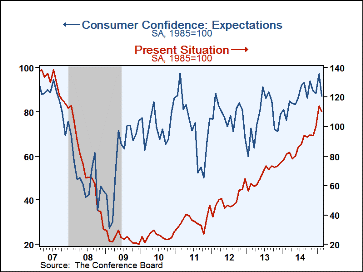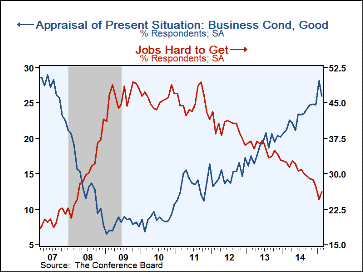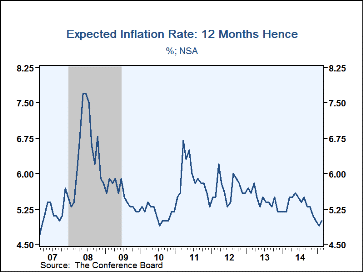 Global| Feb 24 2015
Global| Feb 24 2015U.S. Consumer Confidence Weakens M/M
by:Tom Moeller
|in:Economy in Brief
Summary
The Conference Board's consumer confidence index deteriorated to 96.4 this month from 103.8 during January, revised from 102.9 (1985=100). Nevertheless, it was the highest level since September 2007. The latest figure remained up by [...]
The Conference Board's consumer confidence index deteriorated to 96.4 this month from 103.8 during January, revised from 102.9 (1985=100). Nevertheless, it was the highest level since September 2007. The latest figure remained up by nearly one-quarter y/y but fell short of expectations for 99.0 in the Action Economics Forecast Survey. During the last ten years, there has been a 45% correlation between the level of confidence and the three-month change in real personal consumption expenditures.
A lower expectations figure, off 10.1% (+14.0% y/y), led the way downward. The latest level was the lowest since September. The present situation reading declined 3.2%, but it remained more than one-third higher than the year-ago level.
Business conditions were rated as "good" by an easier 26.0% of respondents. Jobs were viewed as hard to get by a slightly higher 26.2% of respondents, but that remained the fewest since March 2008. Business conditions improvement in six months was expected by a sharply lessened 16.1%; a greatly lessened 13.4% thought there would be more jobs in six months, the least since November 2013. The inflation rate expected in twelve months ticked up to 5.0%, but remained near the recovery low of 4.9%.
By age group, confidence among those under 35 deteriorated sharply but remained up 4.1% versus last year. Confidence amongst individuals aged 35-54 slipped m/m but was at the highest level since August 2007. Amongst those over 55, confidence also slipped but was the highest level since December 2007.
A greatly lessened 0.7% of respondents planned to buy a new home within six months, equaling the fewest since July. An improved 45.8% planned to buy a major appliance within six months, but that remained near the 2011 low. A fairly stable 4.2% planned to buy a new automobile.
The Consumer Confidence data is available in Haver's CBDB database. The total indexes appear in USECON and the market expectations are in AS1REPNA.
The Semiannual Monetary Policy Report to the Congress by Fed Chair Janet L. Yellen is available here.
| Conference Board (SA, 1985=100) | Feb | Jan | Dec | Y/Y % | 2014 | 2013 | 2012 |
|---|---|---|---|---|---|---|---|
| Consumer Confidence Index | 96.4 | 103.8 | 93.1 | 23.1 | 86.9 | 73.2 | 67.1 |
| Present Situation | 110.2 | 113.9 | 99.9 | 36.0 | 87.3 | 67.6 | 49.8 |
| Expectations | 87.2 | 97.0 | 88.5 | 14.0 | 86.6 | 77.0 | 78.6 |
| Consumer Confidence By Age Group | |||||||
| Under 35 Years | 111.7 | 126.0 | 99.4 | 4.1 | 106.6 | 93.1 | 86.5 |
| Aged 35-54 Years | 102.8 | 103.6 | 102.6 | 24.5 | 92.4 | 76.8 | 68.5 |
| Over 55 Years | 84.7 | 91.1 | 83.7 | 34.0 | 73.7 | 61.2 | 56.7 |
Tom Moeller
AuthorMore in Author Profile »Prior to joining Haver Analytics in 2000, Mr. Moeller worked as the Economist at Chancellor Capital Management from 1985 to 1999. There, he developed comprehensive economic forecasts and interpreted economic data for equity and fixed income portfolio managers. Also at Chancellor, Mr. Moeller worked as an equity analyst and was responsible for researching and rating companies in the economically sensitive automobile and housing industries for investment in Chancellor’s equity portfolio. Prior to joining Chancellor, Mr. Moeller was an Economist at Citibank from 1979 to 1984. He also analyzed pricing behavior in the metals industry for the Council on Wage and Price Stability in Washington, D.C. In 1999, Mr. Moeller received the award for most accurate forecast from the Forecasters' Club of New York. From 1990 to 1992 he was President of the New York Association for Business Economists. Mr. Moeller earned an M.B.A. in Finance from Fordham University, where he graduated in 1987. He holds a Bachelor of Arts in Economics from George Washington University.










